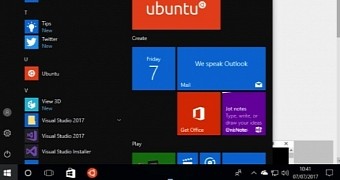Canonical announced today that its popular Ubuntu Linux operating system is now fully supported on Microsoft's second generation of the Windows Subsystem for Linux (WSL).
Windows Subsystem for Linux 2 was announced by Microsoft earlier today during its annual Microsoft Build conference, and it introduces a Linux kernel capable of providing the full set of functionality required for enterprise certification, as well as support for lightweight virtualisation, bringing Ubuntu on WSL to the same level as Azure and AzureStack's capabilities.
"Performance optimisation of Ubuntu in Azure and WSL ensures total efficiency for enterprises developing new Linux applications on Microsoft platforms," said Kiko Reis, Vice President Cloud at Canonical. "Our commitment to security updates for the full stack on any cloud or virtualisation extends naturally to this new WSL environment."
Canonical worked with Microsoft to certify Ubuntu on WSL
In order to simplify the developer experience with version control systems and Integrated Development Environments (IDEs) designed for the Windows operating system, Ubuntu on WSL now integrates Windows file sharing functionality, including Active Directory (AD) integration, as well as integration with other Windows services.
Canonical's Director of Product Stephan Fabel said in a press release that Mark Shuttleworth's company has worked closer with Microsoft to certify the Ubuntu Linux on Windows Subsystem for Linux (WSL), including Snaps, Kubernetes, and Docker containers, to offers users a seamless computing environment for Ubuntu.
The Windows Subsystem for Linux brings a compatibility layer on top of the latest Windows 10 operating system to let users run Linux binarys natively. It features a Linux-compatible kernel developed by Microsoft and it's compatible with several Linux OSes, including Ubuntu, Debian GNU/Linux, OpenSuSE, SUSE Linux Enterprise Server, and Kali Linux. Windows Subsystem for Linux 2 is much faster than the first version and promises to support even more apps.

 14 DAY TRIAL //
14 DAY TRIAL //